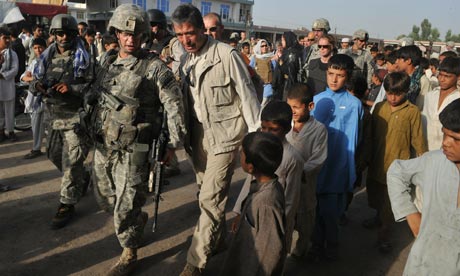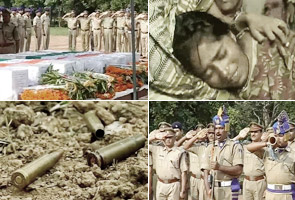Pakistan's cultural capital Lahore was on high alert Friday after two suicide bombers blew themselves up in an Islamic shrine packed with worshippers, killing 42 people and wounding scores more.
There was no immediate claim of responsibility, but Pakistan has been hit by a wave of attacks carried out by the Taliban and other Al-Qaeda-linked Islamist extremists that have killed more than 3,400 people in the last three years.
Television pictures from the scene of the carnage at a shrine dedicated to a Sufi saint showed people crying and beating their chests and heads. Bystanders helped ambulance crews load the wounded into vehicles to take them to hospital.
"The first blast occurred in the basement followed by another one with a deafening sound," said one witness.
"I saw dead bodies and injured people lying on the floor in pools of blood," said another.
Thousands of people were at the shrine in the crowded centre of Lahore dedicated to Sufi saint Hazrat Syed Ali bin Usman Hajweri, popularly known as Data Ganj Bakhsh, at the time of the attacks.
Prime Minister Syed Yousuf Raza Gilani strongly condemned the attacks, saying: "Terrorists have no consideration for any religion, faith or belief."
"These terrorists neither respect human values nor care for human lives, and their brutal act is manifestation of their evil designs," he said.
The shrine's caretaker said the blasts occurred within minutes, triggering panic and sending people running in different directions.
"A total of 42 people have been martyred," Mazhar Ahmad, a senior rescue official told AFP by telephone. Khusro Pervez, the city's top administration official also confirmed the death toll.
Authorities said they had found the heads of two suicide bombers and were investigating how they had penetrated the area despite strict security measures.
Another senior city police official, Chaudhry Shafiq, confirmed two suicide attacks and said one bomber blew himself up in the complex's courtyard while the second detonated his explosive vest in the basement of the shrine.
Hours after the blasts, two firecrackers exploded near the American consulate and Lahore Press club, adding to nervousness in the city.
"Nobody was hurt in these two blasts, these were cracker bombs," Mohammad Faisal Rana, a senior police official told AFP.
Large numbers of police and other security personnel were patrolling all busy and sensitive areas in Lahore, a city of around 10 million people.
Security was particularly tight around mosques ahead of weekly Muslim prayers, Rana said.
Lahore has increasingly suffered Taliban and Al-Qaeda-linked violence, with around 265 people killed in nine attacks since March last year.
The city is considered a playground for Pakistan's elite and home to many top brass in the military and intelligence community.
"There were at least 2,000 to 2,500 people present in the shrine when the twin attacks took place," said the shrine's caretaker, Mian Mohammad Munir.
Gilani said he had directed the provincial government and law enforcement agencies to investigate the attack and catch those responsible.
A senior investigating officer told AFP that the bomber in the basement set off his vest after he was intercepted by a group of worshippers and that police were combing the scene for forensic clues.
Sufism is a mystical movement that spreads the message of Islam through music, poetry and dancing. Radical groups consider the movement, which includes both Shiites and Sunnis, as un-Islamic.
In May suspected Sunni Muslim militants wearing suicide vests burst into two Ahmadi prayer halls in Lahore and killed 82 worshippers.
They were the worst attacks in Pakistan since a suicide bomber killed 101 people on January 1 at a volleyball game in Bannu near the tribal belt along the Afghan border that Washington calls Al-Qaeda's global headquarters.
Taliban and Al-Qaeda-linked militants have orchestrated a three-year bombing campaign in Pakistan to avenge military operations and the government's alliance with the United States over the war in neighbouring Afghanistan.
Source http://www.google.com/hostednews/afp/article/ALeqM5iF-rBwcndcAhfn3KHOlN96w0-vpg












